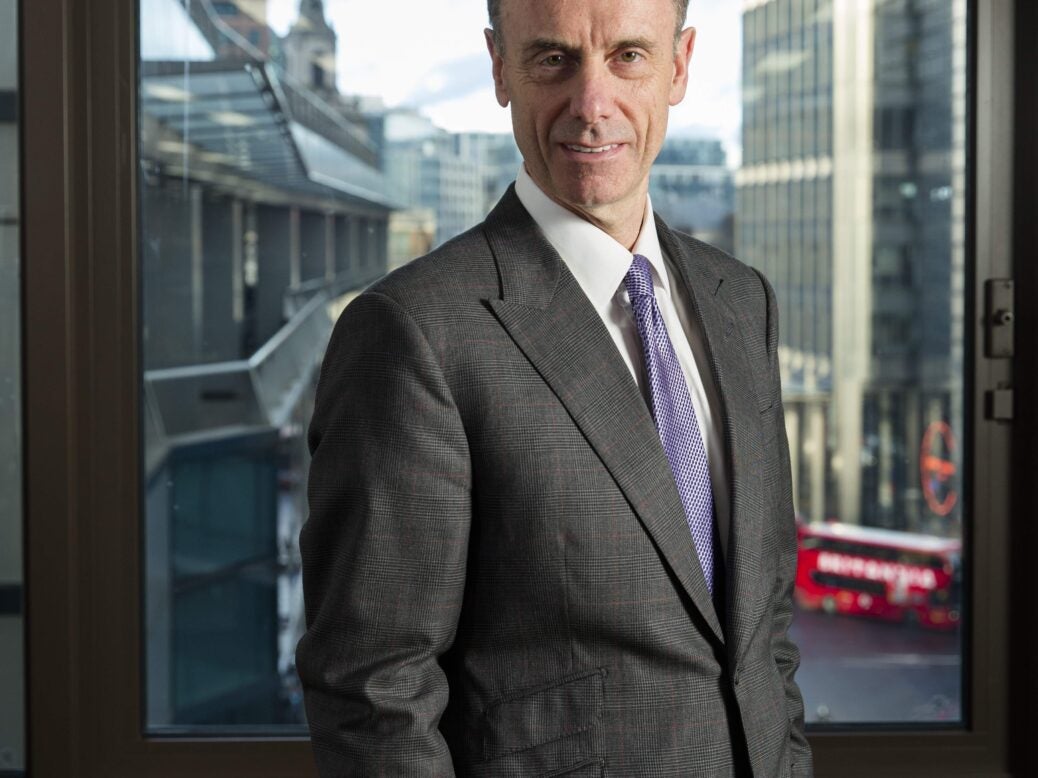
Three years ago Charles Stanley, a fabled City name, was in trouble. Now business is booming. Christopher Jackson meets Paul Abberley, the man behind the turnaround
In this world of rapid change, it is reassuring to consider that emblems of stability exist. If, for instance, you were to find yourself walking the streets of Sheffield in the 1790s and asked the way to Charles Stanley, they could likely help you out. And the same is true today if you walk along Bishopsgate: a name that financed the industrial revolution now has 866 staff across 21 branches.
But longevity has not been seamless. In particular, if you had talked to a Charles Stanley shareholder circa 2014 you’d have heard not a rote description of a venerable firm, but a litany of disappointment. Happily, things have changed again even in the short time since. If it’s a steadier ship now, that’s down to one man: CEO Paul Abberley.
At first, Abberley resembles a Chekhov character – and you could be forgiven for thinking him just another suit. His Yorkshire accent has been burned away – most notably he spent 14 years as head of fixed income at Lombard Odier, and he arrived at the helm of Charles Stanley in 2015 as an outsider to the UK wealth management industry.
What did he see? Abberley describes a bifurcated company which had seemingly happy clients and unhappy shareholders. ‘There was an assumption that if you look after clients the profits will come,’ he says. ‘That’s a dangerous assumption, and it wasn’t working.’
I note the steel behind that ‘it wasn’t working’. Abberley is a man easy to underestimate: you don’t have to spend long with him to sense you’re in the presence of a sharp analytical intellect. He describes the opposition to the vision he wished to pursue: ‘In financial services you’re only dealing with smart employees. There aren’t any unsmart functions, and clever people tend to be more opinionated.’
An entrenched culture needed to be adjusted, even fought: the financials were tightened and the business made more efficient. If the figures are anything to go by, Abberley has succeeded remarkably. Funds under management and advice (FUMA) are up 8 per cent year-on-year to £24.3 billion. Core business revenue, meanwhile, is up 9.8 per cent to £74 million. It would be pointless to quibble with such success. I become interested in how it’s been achieved.
Abberley’s leadership philosophy turns out to be deceptively simple: ‘You have to create the time to spend on leadership,’ he says. ‘Writing emails alone won’t do it. You tend to assume as a leader that people know your strategy; they probably don’t.’ We talk about the need for a simple vision. Abberley wishes Charles Stanley to be ‘the UK’s leading wealth manager measured by quality’ by 2020. He sees this as achievable precisely because of the dispersed nature of the industry: ‘If I felt there were one or two firms up there on the pedestal I’d wonder whether it was credible to try and knock them off.’
What does he mean by quality? Abberley relays how a client recently called Charles Stanley Direct ‘the John Lewis of online execution’ (‘that’s a compliment’). He also admires Old Mutual Wealth for articulating very well the idea of ‘holistic wealth management’. Abberley lapses into all the jargon that can sometimes seem to beset the wealth management industry, talking of Charles Stanley as a ‘vertically integrated one-stop shop’ and, later on, of the need to find ‘plentiful alpha’ even in chaotic markets.
There are two caveats to this, however. Firstly, he always apologises for the jargon – ‘just to use the jargon of the industry for a moment’ and ‘though I hate the phrase’ are common qualifiers in his speech. Secondly, Abberley’s is an essentially independent mind. His independence, in fact, seems an offshoot of his rigorous pursuit of logic: he will let the evidence lead him where it will. Abberley has, for instance, allowed his relationship managers autonomy over their portfolios and is an opponent of too much ‘industrialising’ of investment management. ‘Here a “me too” decision didn’t seem right to me,’ he says simply.
I have heard that Abberley is interested in investing, although he doesn’t impose his investment philosophy on the teams underneath him. When I raise the subject I realise right away that economics is his passion. His conversation quickens with that essentially elastic confidence with which people discuss their fields of expertise.
For him the market is chaotic (‘I don’t think markets are efficient – they’re completely messed up half the time’), and this in turn bestows an obligation to be active rather than passive. But just because there’s opportunity out there – that ‘plentiful alpha’ again – doesn’t mean we should ‘throw in the towel and buy an ETF’, he says. But he does acknowledge that exchange-traded funds are difficult to outperform.
This is where it gets interesting. A market isn’t stable throughout time – ‘markets and opportunity sets are constantly evolving’. Not only that, but opportunity sets vary between asset classes: ‘I don’t think there’s a common technique you can use to outperform in equities, bonds, and currencies.’ And then there’s the third factor, still pertinent in our interconnected world, of jurisdiction. ‘In my old days, when I was a global bond manager, the techniques you’d use to outperform gilts were different from those you’d use with Japanese government bonds.’
Time is perhaps the most interesting element of this, because the period we’re in is so manifestly strange. ‘During a period of quantitative easing it’s going to be a very different environment from the Eighties, when the markets were responding to inflation. The next ten years are likely to be very different and difficult as well.’
So what’s he invested in? ‘For 2018, I’d still be overweight equities and underweight bonds, because clearly the cycle has turned in terms of the bond market,’ he says. Any favoured jurisdictions? ‘The obvious opportunities remain in the US: the stimulus that’s coming through will underpin earnings’. He also notes that the European equities market has some ‘really good momentum in it’.
Abberley is particularly good at describing the surreal nature of recent years. Pointing to a decade of quantitative easing, he is gently humorous: ‘Either we’ve rewritten the rules of economics and all you need for economic growth is a printing press, or there’s a reckoning and we’re going to run out of steam. Intellectually you have to assume it’s the latter.’ He is particularly worried about indebtedness in the global economy and the ever-climbing value of the FTSE: ‘If the ascent in the stock markets in recent years had been better underpinned by capital investment, that might be something. Instead the whole thing feels a bit accounting-based.’
Yet Abberley is still in equities because, unlike the Jonathan Ruffers of this world, he doesn’t think that the combination of Brexit and Trump represents a definitive turning of the tide. But that doesn’t mean it might not turn, and soon. ‘When we look back in 20 years’ time,’ he speculates, ‘we might say that this felt a bit like the late 1800s in America, when we went from free markets to the barons. And perhaps the barons nowadays are the big tech firms. Who knows?’
Then he says something you might not expect from the lips of a CEO: ‘But the people on the losing end of this trend [of inequality] are the workers, to be blunt. People use populism as a term of abuse, but it’s just what people think.’ I wonder whether I’m sitting in the heart of the City of London listening to the CEO of one of its bastions sounding moderately pro-Corbyn.
Is revolution in the air? ‘Civil society will adapt rather than there being some terrible revolution,’ Abberley says, pointing to both Corbynism and the discussions among
the Conservatives regarding social justice. But he adds: ‘These populist phenomena are reactions to perceived unfairness.’ The key word there is ‘perceived’: Abberley points out that inequality after tax has actually narrowed in the UK, but he also references Thomas Piketty (‘a great book’) and the underlying ‘generational trend’ of inequality across other jurisdictions.
These views, bracing as they are, seem somehow to fit the long perspective that a CEO of such a long-standing organisation as Charles Stanley should have. Abberley says: ‘We started out as a bank in Sheffield as one of the financiers of the industrial revolution… and ended up a stockbroking firm rather than a bank. The firm has evolved by being ready to adapt.’ CEOs are not paid to ignore uncomfortable truths.
Abberley is likely here to stay. CEOs, he says, ‘have the ability to master the role and then carry on practising it. We’re very blessed in that regard.’ So Charles Stanley looks set to enter this new era of big data and Twitter under the leadership of this kindly intellectual. It’s lucky to have him.
Christopher Jackson is deputy editor of Spear’s








